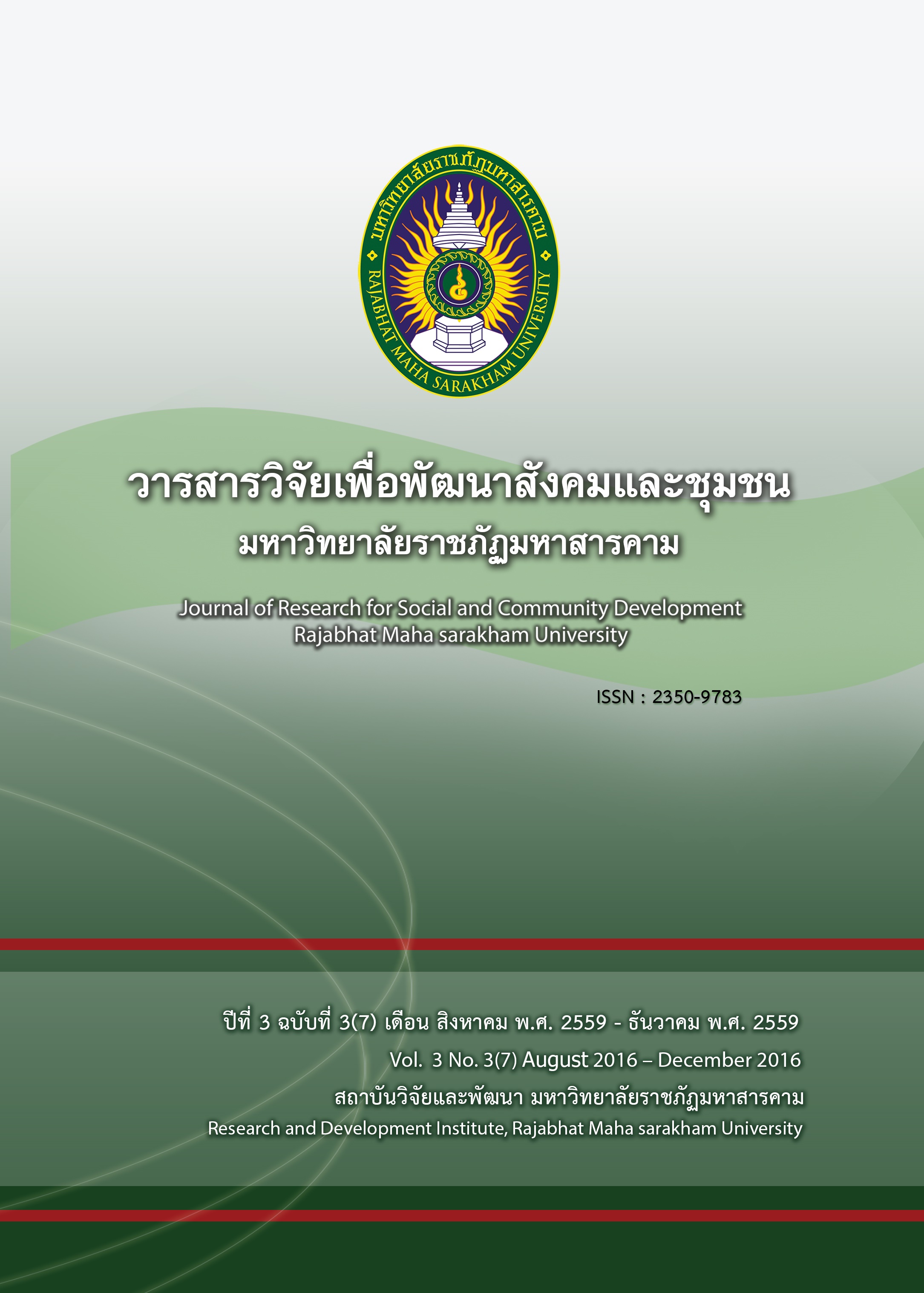Reinforcing Nano Finance Policy and an Alternative Approach to the Reduction on Social Inequality in Thailand
Keywords:
Public Policy, Nano Finance, Social InequalityAbstract
Social inequality, currently, has become another important issue in society that has been widely popular and discussed in every country throughout the world. It seems that the issue of social inequality will continue to be a structural problem in Thai society that has caused the majority of Thai people in the country to suffer. The government of General Prayut Chan-Ocha (year B.E. 2557-present) has recognized and appreciated the people’s needs to formulate Nano Finance under supervision which is believed to increase economic opportunities and to reduce long-term economic and social disparities. Thus, this article aims at explaining the division of Nano Finance under supervision and Impacts on the reduction of social inequality in Thailand. In addition, offering of policy recommendations on the driving of Nano Finance Policy more effectively. It is expected that this will be beneficial to the planning, developing, and improving of Nano Finance policy measures to be used as an alternative fiscal tool for successfully social inequality reducing in Thai society.
References
กังสดาล เชาว์วัฒนกุล. (2557). “ความเหลื่อมล ้าทางสังคมของชุมชนหมู่บ้านจัดสรรในเขตกรุงเทพ เหนือ”. วารสารสังคมศาสตร์และมนุษยศาสตร์, 40 (2) : 67-80.
กิจการปลดหนี สิน สวัสดิการกองทัพเรือ. (2557). การขาดวินัยทางการเงินมหันตภัยใกลต้ัว. นาวิก ศาสตร์, 97 (12) : 66-69.
ซารา แบด. (2559). ระดับโลก!!! ไทยติดอันดับ 3 ประเทศความเหลอื่มล้ ารายได้มากที่สดุ!!!. [Online] : http://www.ispacethailand.org/%E0%B9%80%E0%B8%A8%E0%B8%A3%E0%B8% A9%E0%B8%90%E0%B8%81%E0%B8%B4%E0%B8%88/10374.html.[ 12 เมษายน 2559]
ณัฎฐ์ชิตา เกดิแดง. (2557). จาก'ไมโคร'ถึง'นาโนไฟแนนซ์'หวังอุดช่องกู้นอกระบบ. [Online] : http://www.komchadluek.net/news/economic/194767[12 เมษายน 2559]
ณัฐพงศ์ พันธุ์ไชย. (2558). หนี้นอกระบบ: นาโนไฟแนนซ์ (Nano-Finance). ส้านักวิชาการ ส้านักงานเลาขาธิการสภาผู้แทนราษฎร
นิสาพร วัฒนศัพท์, ฐานิดา บุญวรรโณ และศิวาภรณ์ ไชยเจริญ. (2559). “ช่วงชั นทางสังคมความไม่เทา่ เทียมกันทางสังคมและการอธิบายถึงความเป็นประชากรกลุ่มเปราะบางในสังคม”. วารสารวิจัย ระบบสาธารณสุข, 10 (4) : 362-376.
ยงยุทธ บุราสิทธิ์. (2556). “ชุมชนคนอีสานกับปัญหาความเหลื่อมล ้าทางสังคมในกรุงเทพมหานคร: กรณีศึกษาชุมชนแห่งหนึ่งในกรุงเทพมหานคร”. วารสารภาษาและวัฒนธรรม, 32 (1) : 67-92.
ยุภาวณี เล้าตระกลูชัย. (2558). ความต้องการใช้บริการสินเชื่อนาโนไฟแนนซ์จากธนาคาร ออมสินของ ผู้ค้ารายย่อยในเขตเทศบาลต าบลฟ้าฮ่าม จังหวัดเชียงใหม่. ในเอกสารการประชุมวิชาการ ระดับชาติ มหาวิทยาลัยราชภฏัสวนสุนันทา “การวิจัยเพื่อการพัฒนาที่ยั่งยืน” 3 – 4 กันยายน 2558: 622-632.
วีระชาติ กิเลนทอง. (2559). “บทบาทของการเงินต่อความเหลื่อล ้าในประเทศไทย”. วารสาร เศรษฐศาสตร์ธรรมศาสตร์, 34 (3) : 60-95.
ศูนย์วิจัยเศรษฐกิจ ธุรกิจ และเศรษฐกิจฐานราก ธนาคารออมสิน. (2558). รายงานผลการศึกษาภาวะ หนี้สินของครัวเรือนผู้มรีายได้น้อยของประเทศไทย. กรุงเทพฯ: ศูนยว์ิจัยเศรษฐกิจ ธุรกจิ และ เศรษฐกิจฐานราก ธนาคารออมสนิ.
ศูนย์วิจัยเศรษฐกิจ ธุรกิจ และเศรษฐกิจฐานราก ธนาคารออมสิน. (2559). รายงานผลการศึกษาภาวะ หนี้สินของครัวเรือนผู้มรีายได้น้อยของประเทศไทย. กรุงเทพฯ: ศูนยว์ิจัยเศรษฐกิจ ธุรกจิ และ เศรษฐกิจฐานราก ธนาคารออมสนิ.
ส้านักข่าวไอ.เอ็น.เอ็น. (2559). หนี้ครัวเรือนปี 59 พุ่ง 20.2% สูงสุดใน 9 ปี. [Online] : http://www.innnews.co.th.[12 เมษายน 2559]
ส้านักงานเศรษฐกิจการคลัง กระทรวงการคลัง (2559). รายงานประจ าปี 2559 ส านักงานเศรษฐกิจการ คลัง. กรุงเทพ ฯ : ส้านักงานเศรษฐกิจการคลัง กระทรวงการคลัง
ส้านักงานคณะกรรมการพัฒนาการเศรษฐกิจและสังคมแห่งชาติ. (2558). รายงานการวิเคราะห์ สถานการณ์ความยากจนและความเหลื่อมล้ าในประเทศไทย ปี 2558. กรุงเทพฯ: ส้านักงาน คณะกรรมการพัฒนาการเศรษฐกจิและสังคมแห่งชาติ.
ส้านักงานสถิติแห่งชาติ. (2558). การส ารวจภาวะเศรษฐกิจและสังคมของครัวเรือน ปี 2558. [Online] https://www.service.nso.go.th/nso/nsopublish/themes/files/SocioPocket58M6.pdf [15 มีนาคม 2559]
ส้านักนโยบายระบบการเงินและสถาบันการเงิน ส้านักงานเศรษฐกิจการคลัง. (2558). เรื่องมาตรการ สนับสนุนการเข้าถึงแหล่งเงินทุนของประชาชนรายย่อย (สินเชื่อนาโนไฟแนนซ์). [Online] :https://www.mof.go.th/home/AnnualReport/58-07-01-anoFinance.pdf. [12 เมษายน 2559]
ส้านักนโยบายระบบการเงินและสถาบันการเงิน ส้านักงานเศรษฐกิจการคลัง. (2559). เรื่อง มาตรการ สนับสนุนการเข้าถึงแหล่งเงินทุนของประชาชนรายย่อย (สินเชื่อนาโนไฟแนนซ์). [Online] http://www.fpo.go.th/FPO/modules/Content/getfile.php?contentfileID=12325 [12 เมษายน 2559]
Davtyan, K.,. (2016). Income Inequality and Monetary Policy: An Analysis on the Long Run Relation. Barcelona: Research Institute of Applied Economics.
Era Dabla-Norris, Kalpana Kochhar, Nujin Suphaphiphat, Frantisek Ricka, Evridiki Tsounta. (2015). Causes and Consequences of Income Inequality: A Global Perspective. International Monetary Fund.
Global Wealth Report (2016). The 2016 Global Wealth Report has been published by the Credit Suisse Research Institute. [Online] https://www.creditsuisse.com/corporate/en/articles/news-and-expertise/the-global-wealthreport-2016-201611.html
National Collaborating Centre for Healthy Public Policy. (2012). A Framework for Analyzing Public Policies: Practical Guide. [Online] http://www.ncchpp.ca/docs/Guide_framework_analyzing_policies_En.pdf. [April 15, 2016]
World Bank. (2016). Thailand became an upper-middle income economy in 2011. [Online] http://www.worldbank.org/en/country/thailand/overview.[April 15, 2016]
Downloads
Published
How to Cite
Issue
Section
License
Articles that are published are copyrighted by the authors of the articles







